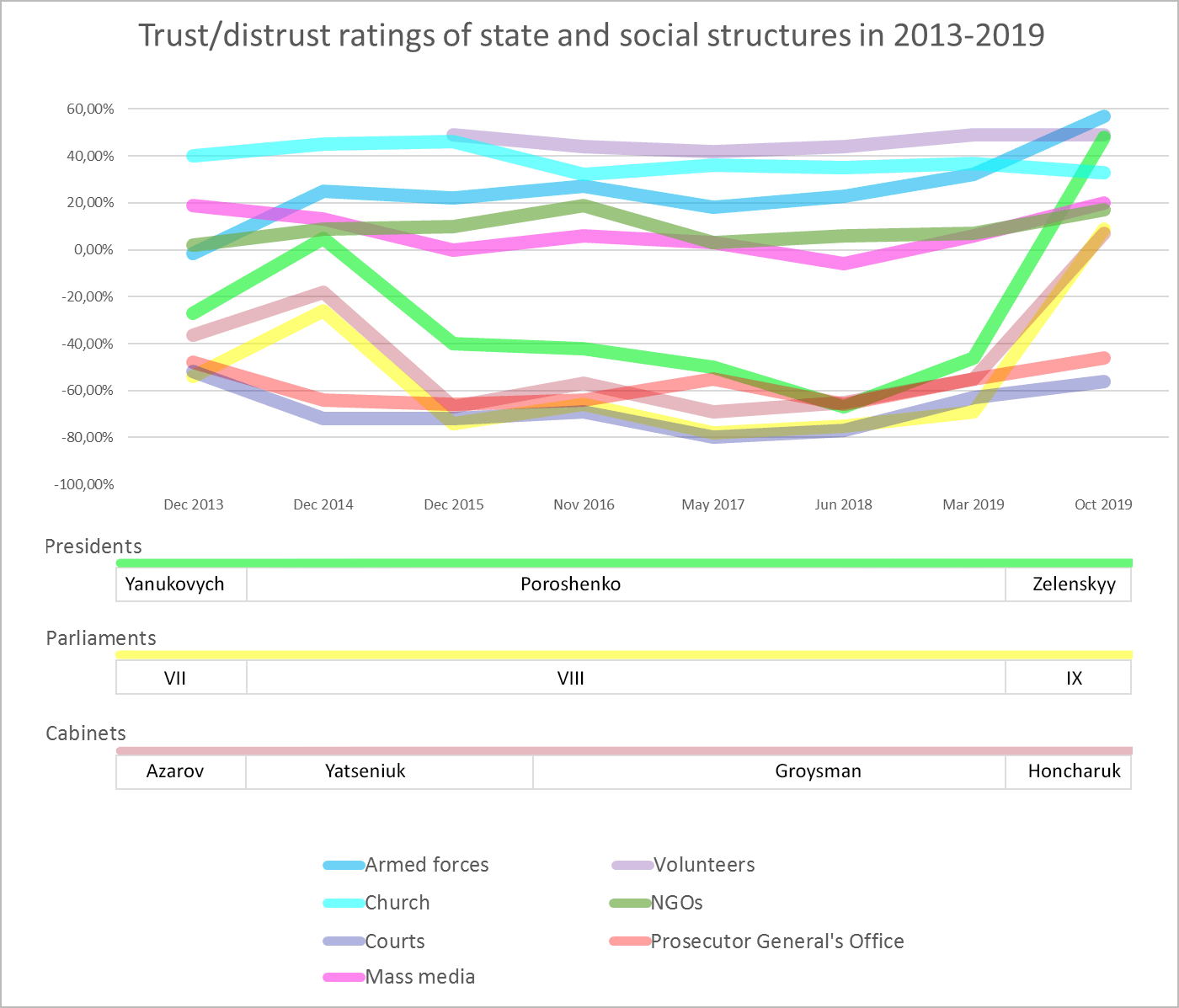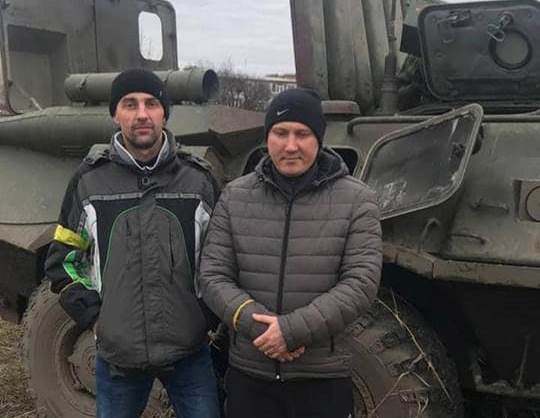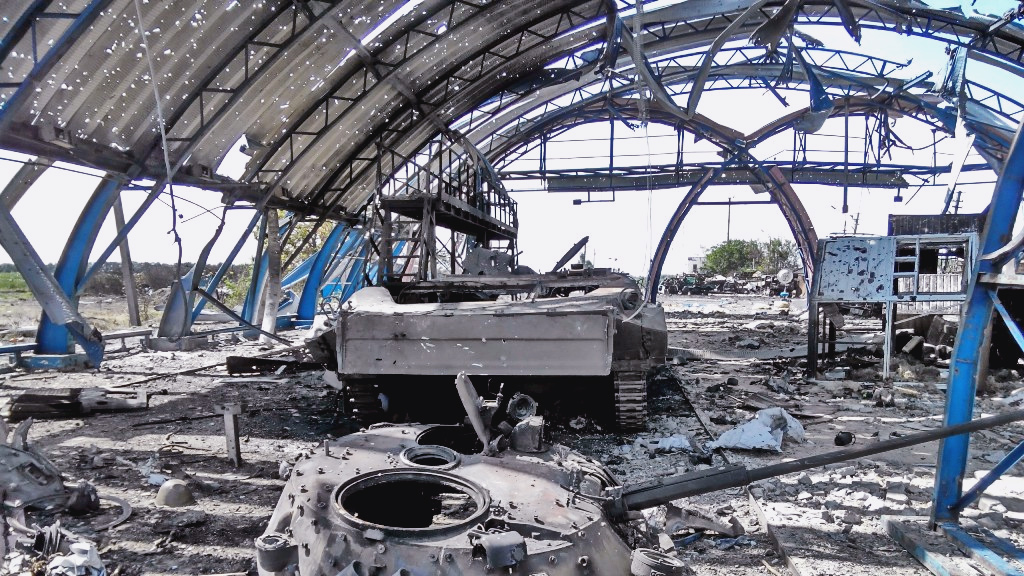(an official term for NGOs in Ukraine).
“2019 went down in the history of Ukraine as a year of significant and unpredictable changes, which some experts even call the ‘electoral revolution.’ A person who had never been engaged in politics before was elected a president (and by a wide margin), the composition of the Verkhovna Rada of Ukraine was renewed by 80%, a new government was formed. Positive expectations regarding the future appeared within society, and the first steps of the new government received high evaluations from citizens,” Iryna Bekeshkina, head of the Ilko Kucheriv Democratic Initiatives Foundation stressed.
At the same time, the report shows that the positive attitude towards civil society organizations, especially civil volunteers has been unchanged. Ukrainian have more trust in volunteers than in the church.
Also, according to the research, the majority of Ukrainians want to have civil society organizations in their cities or villages. However, as compared to May 2018, the share of the citizens who see the need in these organizations decreased by 10% in August 2019. In general, more than half of respondents in almost all regions want to have NGOs in their communities (58% - in western Ukraine, 52% in central, 54% in eastern). The southern region is an exception where only 36% of respondents support this idea.
The share of Ukrainians ready to partly divert their taxes for supporting NGOs did not change as compared to the last year (41%). A third (32%) thinks that it’s better if all of the taxes end up in the state budget funds.
The 65% majority is positive about civil activists who got to the Parliament at this year’s elections:
- 32% are sure that the activists can have a real impact on the situation in the country.
- 33% think that this is the only way for renewing politics.
The other 16% don’t support the participation of civil activists in politics fearing that the MP experience will make them the same as old politicians (9%) or that the activists can be more useful when involved in civil society initiatives (8%).
The level of personal involvement of Ukrainians in social activities remains low (slightly more than 7%). Though, the reasons for that have changed. In 2019, the main reason for social inactivity is the lack of interest in being engaged in such activities while in 2018 it was third after the options “I have no time for such a volunteer work” and “I believe that my participation can’t change anything.”
The overall share of socially active citizens remains stable ranging from 7% to 10% and the 2014 Revolution of Dignity didn’t change it.
The level of public trust in NGOs remains low (17%). Even with 10% of trust gained since March, it still fluctuates within the 2-19% margin since late 2013. The leaders of public trust are the Armed Forces and volunteers, meanwhile, President Zelenskyy is the third, followed by the church. The most distrusted institutions are courts and the Prosecutor General’s Office, while the new Parliament and Cabinet are not distrusted anymore.

The society doesn’t see NGOs as the main driver for reforms anymore. Back in May, the polls showed that Ukrainians placed their major hopes on Groysman’s Cabinet, the second choice was the people, and the option “NGOs and volunteers” with 27% shared the third and fourth position with the Western countries. As of August, only about 9% of respondents put their hopes on NGOs and volunteers, while the majority of the citizens hoped for President Zelenskyy (67%), the newly-elected Parliament (43%), and the new Cabinet not yet appointed at that time (35%).

The research relates the transformation of public opinion to the political changes which occurred in the country in 2019.
“For the first time newly elected president has the trust of 70% of respondents and keeps it for almost half of the year. For the first time newly elected Parliament and newly appointed Cabinet have a positive level of trust,” the paper says.
As the government started to be perceived as the main driver of changes in the country, other key players have been losing their influence on society.
The research concludes that the period when Ukrainians saw civil society as the main driver of social transformations seems to be over. And now the new major task for NGOs is finding the ways and methods to have an influence on the decision making process in Ukraine.
Read also:
- Ukrainian MPs strengthened their immunity from prosecution by adopting a bill meant to lift it
- On eve of Normandy summit, most Ukrainians reject peace at any price
- More than half of Ukrainians see Ukraine’s future in EU, only 13% with Russia: Poll
- New poll results suggest where Russia and Ukraine are heading
- Majority of Ukrainians optimistic about country’s politics for first time in country’s history
- NATO officially gives Ukraine aspiring member status; membership action plan is next ambition (2018)
- Support for joining NATO at a historical high in Ukraine | Infographic (2017)
- Ukraine now more supportive of NATO than Visegrad EU countries (2017)
- Poll results: Slight improvement amid national pessimism in Ukraine, positive local outlook
- What Ukrainians really think: 10 key insights from Ukraine’s 2017 opinion polls
- 30% of Europeans think Ukraine should become part of EU to deter Russian aggression, new poll finds (2015)
- Ukrainians’ Public Opinions: Pro-Europe, Skeptical of Moscow (2014)





